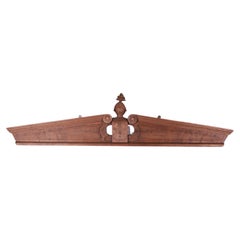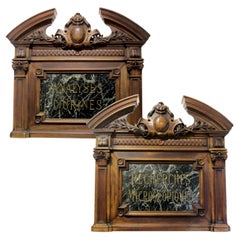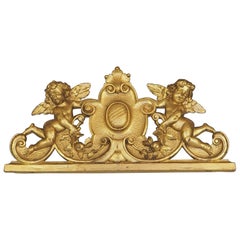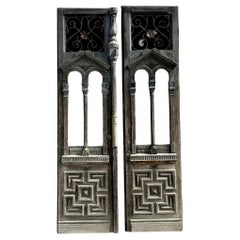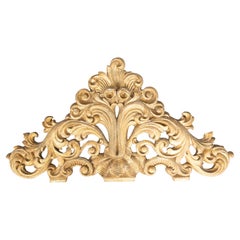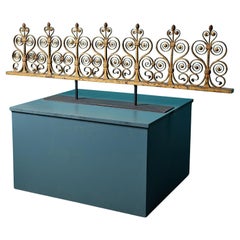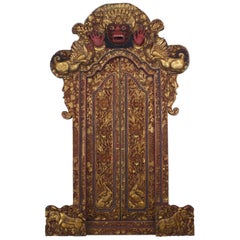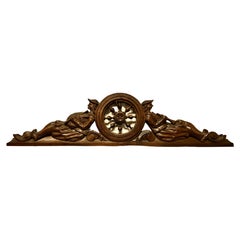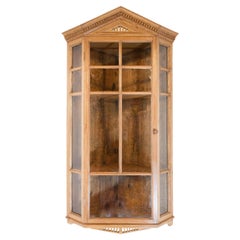Antique Door Pediment
19th Century French Antique Door Pediment
Oak
1880s French Belle Époque Antique Door Pediment
Marble
19th Century Italian Antique Door Pediment
Giltwood
Early 20th Century American Antique Door Pediment
Metal
18th Century Italian Rococo Antique Door Pediment
Giltwood
Mid-19th Century English Gothic Antique Door Pediment
Wrought Iron
Late 18th Century Javanese Tibetan Antique Door Pediment
Wood
Late 19th Century French Provincial Antique Door Pediment
Oak
Late 19th Century English Antique Door Pediment
Pine
Mid-18th Century English George III Antique Door Pediment
Mahogany
Mid-18th Century English Antique Door Pediment
Brass
1830s English William IV Antique Door Pediment
Brass
Mid-18th Century Swedish Rococo Antique Door Pediment
Glass, Wood
19th Century Swedish Gustavian Antique Door Pediment
Wood
18th Century Swedish Antique Door Pediment
Wood
19th Century Swedish Gustavian Antique Door Pediment
Wood
1740s English George II Antique Door Pediment
Glass, Mahogany
18th Century Swedish Chinoiserie Antique Door Pediment
Wood
Early 1900s English Edwardian Antique Door Pediment
Mahogany
Late 19th Century French Art Nouveau Antique Door Pediment
Glass, Mirror, Oak
19th Century Swedish Antique Door Pediment
Wood
Late 18th Century English Sheraton Antique Door Pediment
Harewood
19th Century Swedish Rococo Antique Door Pediment
Wood
1920s Italian Antique Door Pediment
Wood
19th Century American Victorian Antique Door Pediment
Glass, Wood
18th Century Unknown Gothic Antique Door Pediment
Mahogany
Early 19th Century Swedish Antique Door Pediment
Wood
Late 19th Century French Louis XV Antique Door Pediment
Nutwood
Early 20th Century German Antique Door Pediment
Glass, Oak
Mid-18th Century Irish George II Antique Door Pediment
Mirror, Mahogany
19th Century German Rustic Antique Door Pediment
Horn, Animal Skin, Oak
Late 19th Century British Victorian Antique Door Pediment
Bamboo, Glass, Wood, Rosewood
19th Century English Georgian Antique Door Pediment
Silver
Mid-19th Century Swedish Rococo Antique Door Pediment
Glass, Wood
19th Century Sheraton Antique Door Pediment
Glass, Satinwood
Late 19th Century French Empire Antique Door Pediment
Wood
Early 19th Century English George III Antique Door Pediment
Glass, Mahogany
19th Century American Victorian Antique Door Pediment
Mahogany, Maple
19th Century French Louis XV Antique Door Pediment
Ormolu
18th Century English Antique Door Pediment
Other
Mid-19th Century English Antique Door Pediment
Metal, Brass
19th Century British Georgian Antique Door Pediment
Mahogany
1820s Indian Antique Door Pediment
Mahogany, Satinwood
19th Century French Louis XVI Antique Door Pediment
Ormolu
1820s Scottish Regency Antique Door Pediment
Mahogany
19th Century English Victorian Antique Door Pediment
Other
19th Century English Antique Door Pediment
Mahogany
Mid-18th Century French Louis XV Antique Door Pediment
Walnut
Early 18th Century English George I Antique Door Pediment
Mahogany, Satinwood, Walnut
1790s English George III Antique Door Pediment
Mahogany
17th Century Dutch Baroque Antique Door Pediment
Ebony, Olive
19th Century French French Provincial Antique Door Pediment
Wood
1830s English William IV Antique Door Pediment
Brass
18th Century and Earlier Italian Antique Door Pediment
18th Century and Earlier English Antique Door Pediment
Mahogany
Late 18th Century English Regency Antique Door Pediment
Mahogany
19th Century French Antique Door Pediment
Pine, Glass
18th Century and Earlier English Antique Door Pediment
Wood
19th Century British Antique Door Pediment
Glass, Mahogany
19th Century British Antique Door Pediment
Mahogany
- 1
Antique Door Pediment For Sale on 1stDibs
How Much is a Antique Door Pediment?
Finding the Right Storage-case-pieces for You
Of all the vintage storage cabinets and antique case pieces that have become popular in modern interiors over the years, dressers, credenzas and cabinets have long been home staples, perfect for routine storage or protection of personal items.
In the mid-19th century, cabinetmakers would mimic styles originating in the Louis XIV, Louis XV and Louis XVI eras for their dressers, bookshelves and other structures, and, later, simpler, streamlined wood designs allowed these “case pieces” or “case goods” — any furnishing that is unupholstered and has some semblance of a storage component — to blend into the background of any interior.
Mid-century modern furniture enthusiasts will cite the tall modular wall units crafted in teak and other sought-after woods of the era by the likes of George Nelson, Poul Cadovius and Finn Juhl. For these highly customizable furnishings, designers of the day delivered an alternative to big, heavy bookcases by considering the use of space — and, in particular, walls — in new and innovative ways. Mid-century modern credenzas, which, long and low, evolved from tables that were built as early as the 14th century in Italy, typically have no legs or very short legs and have grown in popularity as an alluring storage option over time.
Although the name immediately invokes images of clothing, dressers were initially created in Europe for a much different purpose. This furnishing was initially a flat-surfaced, low-profile side table equipped with a few drawers — a common fixture used to dress and prepare meats in English kitchens throughout the Tudor period. The drawers served as perfect utensil storage. It wasn’t until the design made its way to North America that it became enlarged and equipped with enough space to hold clothing and cosmetics. The very history of case pieces is a testament to their versatility and well-earned place in any room.
In the spirit of positioning your case goods center stage, decluttering can now be design-minded.
A contemporary case piece with open shelving and painted wood details can prove functional as a storage unit as easily as it can a room divider. Alternatively, apothecary cabinets are charming case goods similar in size to early dressers or commodes but with uniquely sized shelving and (often numerous) drawers.
Whether you’re seeking a playful sideboard that features colored glass and metal details, an antique Italian hand-carved storage cabinet or a glass-door vitrine to store and show off your collectibles, there are options for you on 1stDibs.
- What is a door pediment?1 Answer1stDibs ExpertApril 5, 2022A door pediment is the triangular piece of material that sits under where two roof points meet. In classical buildings, the pediment was typically supported by columns. Shop a selection of door pediment décor from some of the world’s top sellers on 1stDibs.
Read More
The Ultimate Guide to Types of Tables for the Home
Whether you’re just moving in or ready to give your home a makeover, our guide will give you pointers on tables that are fitting for every room, nook and hallway.
What Exactly Is a Secretary Desk, and What Is It Used For?
The furniture equivalent of a Swiss Army knife, it's the multifunctional piece you didn't know you needed.
This Shelving System with Oxidized Brass Tubes Is Retro and Futuristic at Once
Italian studio DimoreMilano mustered great ingenuity when crafting these sculptural shelves, which are built without any screws.
28 Cheerful Home Bars, Where Everybody (Literally) Knows Your Name
Simple or sophisticated, equipped with console, cart or custom cabinetry, these stylish bar areas deserve a toast.
Ask an Interior Designer: Work-from-Home Edition
Leaping into a design project, whether it's refreshing the bedroom or redoing the whole house, can be overwhelming. Luckily, we know more than a few interior designers. You asked questions on Instagram, and now they're answering.
Collected and Eclectic, ‘Wunderkammern’ Are Back in a Big Way
Introduced nearly 500 years ago, curiosity cabinets are finding new fans among today's collectors and designers.
Meet the Incredible Woman Transforming Fallen Trees into Sleek Furniture
In the hands of New York Heartwoods cofounder Megan Offner, unwanted local trees become works of design art.
These New York Architects Love a Complicated Project
From Brooklyn townhouses to Maine campgrounds, Trattie Davies and Jonathan Toews relish a challenge, like transforming a former warehouse space into the new 1stdibs Gallery.
